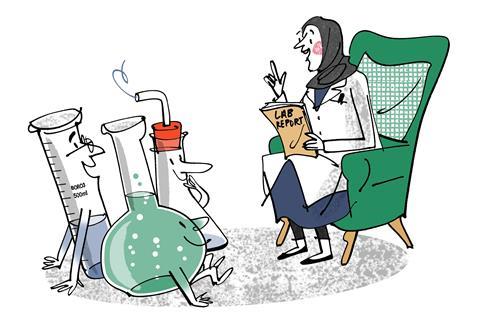A formal writeup of an experiment has much in common with a thrilling story
I remember the first time I stepped into a chemistry lab for which I had to write a formal lab report. As I stood there, surrounded by an array of reagents and equipment, reading through the well-defined instructions for the interesting experiment to measure reaction rates, I had no doubt that my storytelling skills would let me excel in the task of writing a formal lab report. This report was not just the documentation of an experiment; it was a new fun story to be told.
Conducting a chemical experiment can be a very exciting part of learning chemistry. However, just performing experiments is not enough to make you into a chemist. Good skills are needed to document the results, observations and conclusions. I believe that in the mind of every chemist there is a storyteller ready to transform the details of an experiment into a well-written report.
One of the most critical steps in successfully writing a chemistry report is to prepare before the lab session. A storyteller needs to keep reading to get different ideas and make sure to record the ideas that arise while preparing. Similarly, one of the most important tips for writing a good report is to read the experiment in the lab manual before you come to the lab. This made a huge difference in my understanding of the experiment and the theory behind it.
The plotting continues
Another important tip is to take very good notes. Write down all the changes made to the experimental procedures during the experiment, as well as the experimental observations; for instance, how the colour of the solution changes or the temperature and pH value. Recording these details plays a major role in gathering all the information needed to write a perfect report.

As soon as we finished the experiment, I began planning for the report. I remember the question I asked myself the most: which section do I have to start with? Just like writing a story, I started by thinking about my characters, which are in fact my materials and instrumentation – in the case of that experiment, the stars of my story were the thiocyanate ions and iron chloride! Then, I worked on my methodology and results and finally wrote the introduction and conclusion.
I found out then that writing a report is more like writing a story. And like a good story, a good chemistry report features well-connected events and a coherent plot. The introduction sets the scene; the methodology introduces the characters involved in the main action – in this case, your materials. The plot unfolds in the experimental results, and finally the falling action proceeds and reaches a resolution in the discussion and conclusion sections. This analogy of report and story elements makes it much easier for us to think about writing a chemistry story!
The steps of writing a scientific report might differ from one student to another. However, the order I followed helped me understand the experiment very well. By starting with the results and methodology, I could then reflect on the understanding they gave me when I wrote the introduction and use this to comment on the experiment’s applications and significance.
Never give up
One challenge facing students when writing a chemistry report is getting used to the formal scientific English writing style that they have to follow. Additionally, using English as a second language can make writing a very daunting task. Practising English writing (not just to write reports) and getting feedback from writing specialists can have a great impact on students’ writing development and their academic performance. Practicing writing in your mother tongue can also support your skills development as writing is more like a thinking process that you perform using different languages. Even with practice it can take some time for students to learn, but this can be accelerated through attending workshops on academic writing.
Chemistry reports are powerful documents that help students to understand the experiment and retain the information for their final exam. Just like a story with an interesting plot that cannot be forgotten, working on the lab report and developing ideas on your own will help you remember the experiment for the final exam effectively. For my first chemistry lab report, my storytelling techniques helped me gain an excellent grade, which has encouraged me to keep on using this strategy when writing my other future reports. My one piece of advice for chemistry students is to make sure to use the opportunity to write chemistry reports to enhance their writing skills, and never give up if they face any challenges in writing.












No comments yet